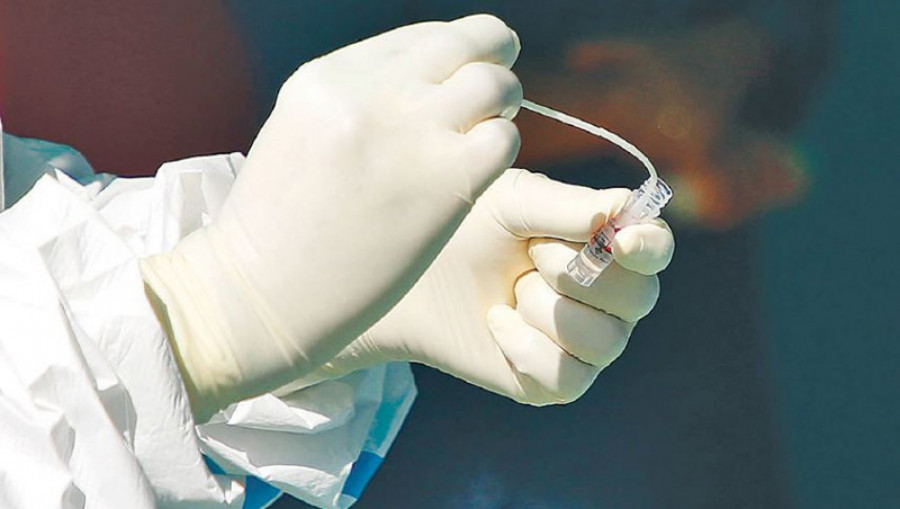Health
Covid-19 vaccination may have started, but health experts are concerned about new variants
With technology to detect new variants not available, and inoculation taking time to complete, doctors urge all to continue following safety measures strictly.
Arjun Poudel
A sudden surge in new Covid-19 cases in Pokhara lately set off alarm bells among health officials, as the new trend in the city was contrary to what was noticed in other areas, including Kathmandu, where the number of infections was coming down. Polymerase chain reaction tests conducted on swab samples of those people who had come into contact with those who had returned from abroad showed they were positive for Covid-19 but negative for “s-gene target”.
In December, when lab reports showed “s-gene” negative for some people who had returned from the United Kingdom, the Health Ministry had sent the swab samples to the World Health Organisation’s collaborating centre in Hong Kong.
The Health Ministry confirmed in January that three of the six people who had returned from the United Kingdom were infected with the new virus variant.
A senior official at the Department of Health Services said that authorities in Pokhara were asked to send swab samples of the infected people, who had come in contact with the people who had returned from abroad, to Kathmandu.
“They were confirmed to have been infected with Covid-19, but we need to conduct a whole-genome sequencing test to confirm if they were infected by the new variant,” the official told the Post requesting anonymity.
The swab samples from Pokhara were tested at the National Public Health Laboratory, one of the most advanced government-run laboratories in the country.
But this lab also does not have the technology to confirm the mutations–especially on the spike protein.
Experts say the s-gene target failure during polymerase chain reaction tests, which often happens when there is a mutation on the spike protein, is a cause for concern, for it could mean people have been infected with the new variant of coronavirus.
“Without spike protein, the coronavirus cannot infect people,” Dibesh Karmacharya, chief executive officer at BIOVAC Nepal Pvt Ltd, told the Post. “If the polymerase chain reaction tests are failing to detect the spike proteins in the swab samples of the infected people, there is a possibility that the virus may have undergone mutations or the virus could be of a different variant.”
Spike protein is one of the key biological characteristics of SARS-CoV-2, which enables the virus to penetrate host cells and cause infections.
Unlike bacterial and fungal pathogens, which can survive without a host cell to infect, viruses cannot. They have to get inside cells to replicate.
Coronaviruses are surrounded by a fatty membrane—called envelope—whose composition is similar to human cells’ outer layering that is designed to ward off any invaders.
In order to get into cells, the enveloped coronaviruses use proteins (or glycoproteins) to fuse their own membrane to that of cells’ and take over the cell.
The spike protein of coronaviruses is one such viral glycoprotein. Without spike protein, viruses like SARS-CoV-2, won’t be able to interact with the cells of human beings to cause infections.
“A whole-genome sequencing test is the only way to confirm if the people whose swab samples we have received from Pokhara have been infected with the new variant,” said the official at the Department of Health Services. “We don’t have the technology to do so. We have preserved those samples.”
Ever since the coronavirus was first detected in humans in Wuhan of China in December 2019, it is believed to have undergone thousands of changes.
After the UK reported the new variant, it is said to have been seen in more than 70 countries.
Authorities, however, have not paid attention to people returning from other countries.
Experts say that the new variant of the coronavirus might be responsible for a spike in new cases in Pokhara, a popular tourist destination.
“The spread of the new variant cannot be ruled out in densely populated cities like Pokhara and Dharan which see frequent travels to and from the United Kingdom,” Dr Sameer Mani Dixit, director of research at Center for Molecular Dynamics Nepal, told the Post. “We must not drop our guard against the risk of infections. We should keep following safety measures until a half of the population is vaccinated.”
Nepal has launched its vaccination drive against Covid-19 with the Oxford-AstraZeneca’s Covishield vaccine, which is locally manufactured by the Serum Institute of India.
After starting the inoculation exercise on January 27 with one million Covishield doses provided by India, the government is planning to launch the second phase of vaccination in March.
Nepal needs to inoculate around 72 percent of its 30 million population for which it needs around 45 million doses of vaccine.
Experts say the good thing is that recent reports suggest the Oxford-AstraZeneca vaccine has been recommended by the World Health Organisation for its wide use.
There have been concerns about the effectiveness of the vaccines developed so far in people who are infected with the new variants.
The UN health agency’s Strategic Advisory Group of Experts on Immunization, known as SAGE, said on Wednesday that it recommends using the vaccine developed by the University of Oxford and AstraZeneca even in countries tackling new variants of coronavirus. In their interim recommendations, the experts’ panel said the vaccine is 63 percent effective overall.
However, early data from trials in South Africa showed the vaccine was offering "minimal protection" against mild and moderate disease in young people, according to the BBC.
The new variant, the one identified in the UK, is said to be more infectious than the regular variant that has been spreading throughout the globe.
According to the United States’ Centers for Disease Control and Prevention, this variant spreads more easily and quickly than other variants. In January 2021, experts in the UK reported that this variant may be associated with an increased risk of death compared to other virus variants, but more studies are needed to confirm this finding.
“The vaccine we have been using may not work against the South African variant,” Dr Sher Bahadur Pun, chief of the Clinical Research Unit at Sukraraj Tropical and Infectious Disease Hospital, told the Post. “We should be more cautious and take measures to contain the spread of infection in the country.”
Doctors are concerned if excessive focus on vaccines could make people complacent and they could stop following safety measures. The authorities must keep running the awareness campaigns and the general public must not forget that the threat is not over yet, given the possibility of the spread of new variants, according to them.
“Virus mutation is a continuous process, so it won’t be surprising if new variants are circulating,” said Pun. “Everyone should continue to follow safety measures strictly, even those who have been vaccinated.”




 25.15°C Kathmandu
25.15°C Kathmandu















